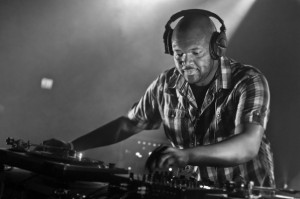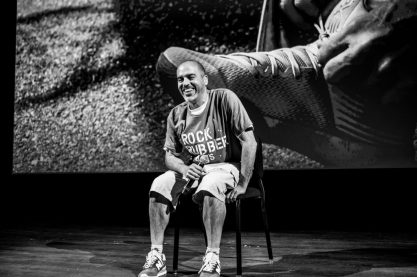Interviews
INTERVIEW: JOE NICE and the HISTORY OF DUBSTEP IN AMERICA, PART ONE
On February 12th, dubstep takes the stage. Nominated for five Grammy awards to be decided that evening, Skrillex, a former US-based screamo singer turned dance producer, has become the new face of worldwide dubstep. Emerging from the dark underground of the UK dance scene, dub reggae and drum and bass' percussive heavyweight of a cousin has infiltrated the American mainstream. When Rusko, the top-tier general of the sound's second generation of Eurpean producers blended pop sensibilities with next level sonic power, it ignited the US underground dance scene. Tracks like "Cockney Thug" and the remix to Kid Sister's "Pro Nails" weren't the first major dubstep anthems heard stateside, but by galvanizing hipster interests in English underground dance, it became the defining sound that took a beloved back room sound to the front of the dancehall, and to big rooms, festivals and stadiums worldwide. Now it's no longer a British thing, or a hipster thing, it's everyone's sound, pop as divisive as Chuck Berry or the Beatles or Black Sabbath at their respective heights. Love it or hate it, producers like the aforementioned Skrillex, or ex-drum and bass head John "12th Planet" Dadzie have the control of the globe's imagination, and are about to cash in in a major way. According to the "US ambassador of dubstep" Joe Nice, it wasn't always like this over here.
[youtube]http://www.youtube.com/watch?v=cR9ofItBvLg[/youtube]
Joe Nice is a UK-born native of Baltimore, MD. Tiring of a respected career as a Baltimore club producer, he "fell out of love" with the sound and looked for beats that were "fresh and interesting" and would "open (his) mind to the possibilities of sound." Nice discovered UK garage producer Wookie, but it was hearing early dubstep maestros Benga, Skream, Horsepower Productions and Kode9 that piqued his interest, but a particular date sealed his fate.
[youtube]http://www.youtube.com/watch?v=RXH2QHim8TY[/youtube]
"Oh yeah. I still have the flyer. Starscape Festival. Baltimore. June 8, 2002. UK Invasion tent." On that date, the internationally-respected celebration of hard sounds featured the likes of Hatcha, a UK dubstep originator, and a plethora more. "It was amazing. I'd never heard this sound outside of my bedroom, and I was one of the very few who knew exactly what was happening in the crowd." The noted DJ compares his developing love of dubstep to a romantic courtship. "We went on a really long date, and I decided I would let her spend the night. Then she never left."
[youtube]http://www.youtube.com/watch?v=bv2tw2snXhw[/youtube]
The dub reggae culture that defines dubstep's origins was not foreign to the producer. "My family's roots are from Trinidad. I grew up hearing steel drum, soca and calypso. My dad would drink his Carib beer, fix cars on Saturday afternoon, and we'd hear Neal Matthai on 88.9 FM Morgan State University radio." Calypso legend Dr. Slinger "The Mighty Sparrow" Francsico left a mark as well. "If you don't know the Mighty Sparrow, it's not your fault. But you should listen to him. He's like the Beatles, Ravi Shankar, Fela Kuti and Chuck Berry of calypso, rolled into one man."
In an era prior to the significant rise of the internet, Nice describes searching for the sound as a rather involved process. "I was a DJ playing a regular night in the lounge at (Baltimore performance venue) Sonar, and I was going in on Dubstep. It would be me, my MC, Twisty, his girlfriend and sometimes, like ten people, but I didn't care." In 2002, strange new dance melodies didn't spread via Youtube or Soundcloud. "There were a limited few web forums and message boards. There was dubplate.net, where you could find pirate broadcasts from overseas, and Yahoo forums, too. If you had ten people in your Yahoo group who were all contributing, you were like, YEAH! I'm onto something." Clearly, in retrospect, they were.
Nice's championing of the sound in the United States gave BBC Radio 1XTRA DJ J Da Flex the idea of inviting Joe overseas to visit and get a primer on the culture in its most primal state. "It was in 2002. Thanks to Jada, because he gave me the underground knowledge. I flew over, and ended up staying in some kind of south London death house. I navigated my way through the tube, and joined him for his radio show." The experience didn't stop there though, as a journey to the epicenter of the scene captivated Nice's imagination. "I went to Forward, which was in Shoreditch at a club called Plastic People. (pioneering then-teenage dubstep DJ) Youngsta was on the decks, killing it, and a few things were on my mind: "How is it that this much bass can be vibrating through my body at one time, and how can bass make me feel warm?"
Armed with this knowledge, the "ambassador" set forth to change the sonic face of the United States...
PART II TOMORROW!
For more information on Joe, feel free to follow him on Twitter at @joenicedj.


